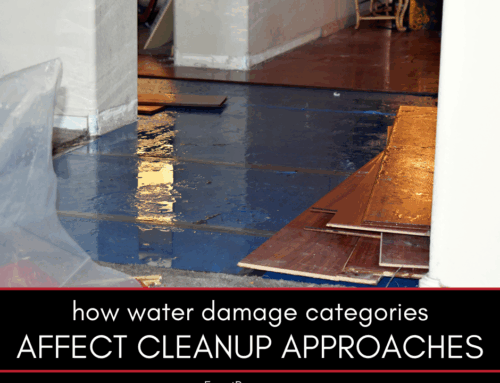Wood is one of the most vulnerable materials when it comes to water exposure. Leaks, floods, or high humidity can leave wood with lasting odors that signal hidden problems. Knowing why the smell occurs and how to treat it helps protect both your home and your health.
Why Water Damaged Wood Smells and How to Eliminate Odors
Water damage doesn’t just warp or stain wood—it also leaves behind smells that can linger for weeks. Those odors are often a warning that more damage is hiding beneath the surface. This guide explains the following:
-
Why water damaged wood develops odors
-
Common types of odors and what they mean
-
How to treat minor wood odors at home
-
When odors signal hidden mold or bacteria
-
Why professional odor removal is sometimes necessary
Here’s a closer look at each.
Why Water Damaged Wood Develops Odors
Wood is porous, which means it absorbs moisture easily. When water soaks into wood fibers, it creates the perfect conditions for bacteria and fungi to grow. As these microorganisms spread, they release gases that create musty or sour odors.
According to the Environmental Protection Agency, moisture left unchecked in porous materials like wood is the leading cause of mold and odor issues inside homes.
Common Types of Odors and What They Mean
Different smells can point to different problems:
-
Musty odor: Usually a sign of mold or mildew growth inside the wood
-
Sour smell: Caused by bacteria breaking down soaked fibers
-
Smoky or earthy odor: May occur if wood was damaged in both a fire and flood event
-
Chemical smell: Sometimes linked to contaminated floodwater
Recognizing these odors helps you decide if simple cleaning is enough or if you need mold remediation.
How to Treat Minor Wood Odors at Home
If wood was exposed to clean water for a short period, you may be able to eliminate odors yourself. Steps include:
-
Drying the wood fully with fans and dehumidifiers
-
Sanding the surface to remove stained or smelly fibers
-
Cleaning with a mild detergent and water solution
-
Applying baking soda or activated charcoal nearby to absorb odors
Always confirm that the wood is completely dry before refinishing or sealing.
When Odors Signal Hidden Mold or Bacteria
If odors persist after cleaning, it often means mold or bacteria are trapped inside. This is especially true for structural wood, subflooring, or furniture with multiple layers.
The Centers for Disease Control and Prevention warns that mold exposure can cause coughing, wheezing, and other health problems. Persistent odors are a sign that professional cleanup is needed.
Why Professional Odor Removal Is Sometimes Necessary
Professionals use commercial drying systems, air scrubbers, and antimicrobial treatments to remove odors at the source. In cases where wood is too damaged, they may recommend replacement as part of reconstruction.
Calling experts ensures the smell isn’t just covered up but fully eliminated. It also reduces the risk of long-term structural issues and health hazards.
FAQ About Water Damaged Wood Odors
Check out these commonly asked questions about water damaged wood odors. If you don’t see your question here, please call our office and we’ll find you the answers you need.
Why Does My Wood Floor Smell after a Leak?
Moisture trapped under boards or in subflooring can cause mold or bacteria to grow, which produces odors.
Can I Just Use Air Fresheners to Cover the Smell?
No. Covering odors doesn’t remove the cause. The wood must be dried, cleaned, and sometimes treated professionally.
How Long Does It Take for Wood Odors to Go Away?
If wood is dried quickly, odors may fade in a few days. Lingering smells mean moisture or mold is still present.
Do All Water Damaged Wood Items Need to Be Replaced?
Not always. Minor damage can often be cleaned and salvaged, but heavily soaked or moldy wood may require replacement.
When Should I Call Professionals for Odor Removal?
Call if odors persist after cleaning, if you see mold, or if the damage covers a large area. Professionals can ensure safe, complete restoration.
Water damaged wood smells because moisture feeds mold and bacteria inside its fibers. Addressing odors quickly with drying, cleaning, or professional help protects your home, restores comfort, and prevents hidden hazards.
Do You Need a Disaster Remediation Expert in Washtenaw County or Jackson County?
If your home has already been damaged, we can help. Check out our services and call Exact Recon for your free disaster remediation quote today. We offer:
- Water damage restoration
- Fire damage restoration
- Mold removal and remediation
- Fire and smoke restoration
- Sewer cleanup and disinfecting
- Reconstruction
- Wind and storm damage repair









